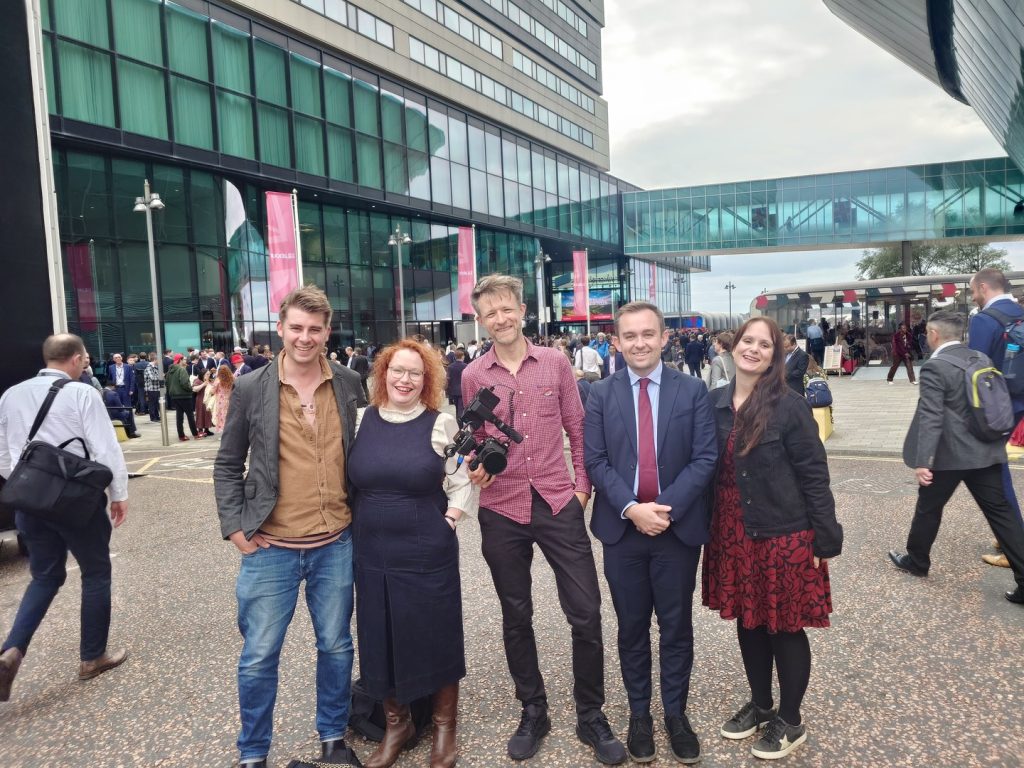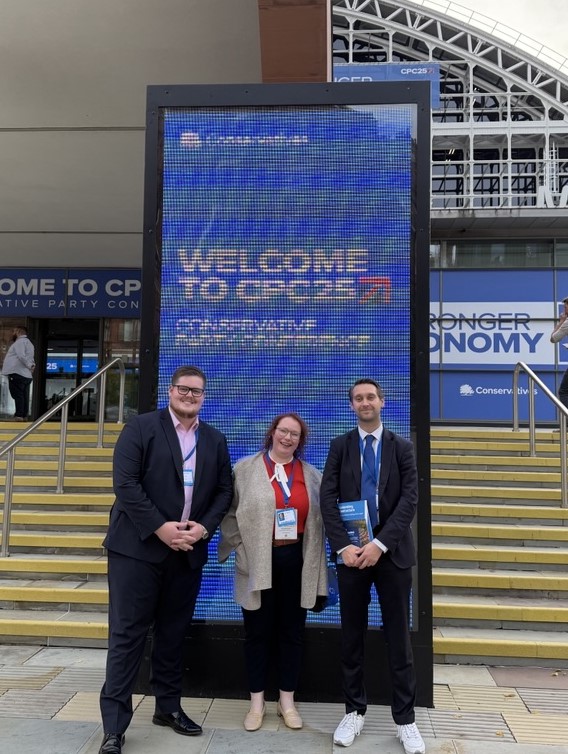Reflections on Labour and Conservative conferences
Written by Harry Gilham, Senior Account Director, and Darren Mason, Account Director.
Planning and Housing were the big themes of the Labour Party conference in Liverpool, with the newly appointed Secretary of State for Housing Steve Reed taking to donning a “Build Baby Build” cap and the sizeable Labour YIMBY campaign group corralling its members to welcome him by way of mini-rallies and housing relating merchandise, which kept popping up across the Conference centre.
Away from the hype of the rallies and Reed’s commitment to do “whatever it takes” to deliver on the promises, there were a few concrete signs of action. Reed used his conference speech to announce the location of, and the start of development work on, twelve “new towns” the Government has committed to building – with each being at least 10,000 dwellings in size. On some of these, notably the well-located Tempsford, building work is pledged before the next General Election – an ambitious target.
Many of the housing and planning fringes were packed out across the three days of Conference, with social rent as popular as a subject as planning reform among sections of the membership. Nick Williams, Downing Street’s economic advisor, stood in for Reed at a well-attended Labour Together fringe on the Monday of Conference where he spoke of the pride he had for the £39bn affordable homes programme, the need for “more of everything” in terms of housing tenure, and the economic necessity for the 1.5 million homes target to be hit,
Given the fiscal pressures the Government faces, and the realities of what will be a tough Budget in November, it seems likely that the YIMBY and planning reform agenda will receive another shot in the arm from the Government on the back of how central it was in Liverpool. With the return of Parliament this week, a raft of amendments to the Government’s Planning Bill have already been announced to further cement this agenda, although it remains to be seen if these amendments will go far enough for the most vocal YIMBYs in Labour’s membership.
Suggestions of a further Planning or Infrastructure Bill continue to be made but things will not become clear until at least the King’s Speech, due at some stage early in the new year.
Labour will hope to deliver on its promises to both the vocal and active YIMBY section of its membership and the potential pay-off of economic growth by having many spades in the ground by 2028. Whether than can or not, remains to be seen but their political future seems tied to this agenda.
Whilst the numbers were down at Conservative conference this year, the number of policies unveiled was certainly not. This year’s conference saw a party that was being more honest with itself about its failings in Government and recognising which policy areas it needed to focus on. The mood was generally downbeat amongst conference attendees about the Party’s position in the polls. However, Kemi Badenoch’s final speech galvanised the membership with the announcement of abolishing stamp duty for first time buyers and opened up clear blue water with the Labour Party ahead of the Budget in November.
The policies announced have been broadly welcomed; abolishing stamp duty for first time buyers, (widely seen as a regressive tax), abolishing business rates for hospitality businesses and small shops and the promise of a £5,000 NI break for youngsters. However, question marks remain about how they can be properly funded, with some economists already questioning the viability of delivering the savings from welfare and the Civil Service that Mel Stride outlined. What was most promising though from conference in my opinion was the serious discussions at fringe events on planning reform and housing policy.
Numerous MPs and attendees acknowledged the Conservative party had failed young people by not delivering the houses the UK needs when in Government. Many MPs spoke about how the link between people voting Conservative due to having a stake in society with a home and family had been severed due to housing unaffordability. It was this electoral realisation that the Conservative Party will die if it does not deliver more housing that drove the serious talk on planning reform. There was too a realisation that it is not just planning reforms that need to be enacted in order to make housing more abundant and cheaper. MPs and panellists spoke of the need to look at regulations holding the sector back. These ranged from the Building Safety Act, the second staircase rule in London, environmental regulations, minimum space standards, balcony sizes, affordable housing requirements and other egregious regulations.
There are growing signals within the Party that a future Conservative Government would look to enact both supply side reform and demand reforms as part of a retail offer to young voters, which nowadays means those under 45. Housebuilders should look beyond the stamp duty abolition announcement to the discussions in the fringe events for the future of Conservative Party policymaking in the area. For housebuilders it would be worth starting to engage with the Party again on this subject. A Conservative Party spending time seriously developing workable planning reforms will put pressure on the Government to do the same or similar.
On energy policy Shadow Energy Ministers frequently referenced support for nuclear power and extracting more oil and gas from the North Sea to ensure greater energy security. Whilst the Party was not as negative as Reform on renewables, they certainly were not overly positive. In the fringe events I went to, wind and solar was barely mentioned. Supporting nuclear is a completely hypothetical position to take for the party. At present, only two nuclear power stations are being built. Whether the Conservative Party locally and nationally will be as supportive of SMR’s and traditional nuclear power stations when the inevitable local opposition emerges to them remains to be seen. The renewable industry needs to continue to engage with the Conservative Party on the benefits it brings, particularly regarding how much faster and cheaper it is to build renewables than nuclear.
Of course, the Conservatives have a very long road back into Government. Moreover, there may still be future direction shifts under different leaders. However, for the built environment sector conference 2025 demonstrated a growing section of the party finally starting to take an interest in building homes and delivering meaningful planning reform.
Below are a few pictures of the team at the Reformer, Labour and Conservative Party Conference.







